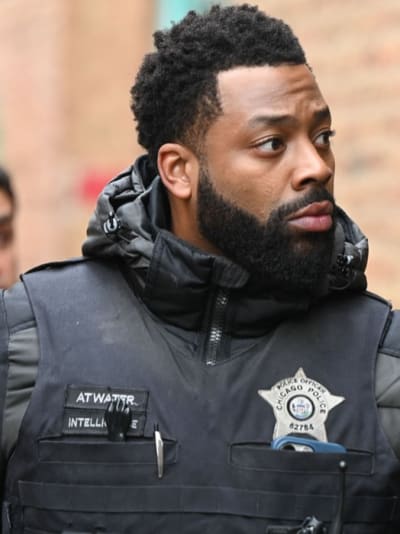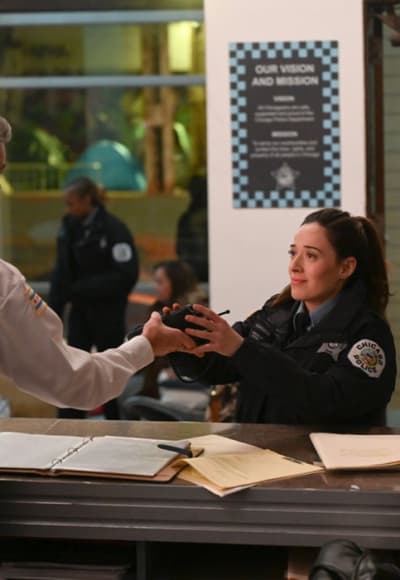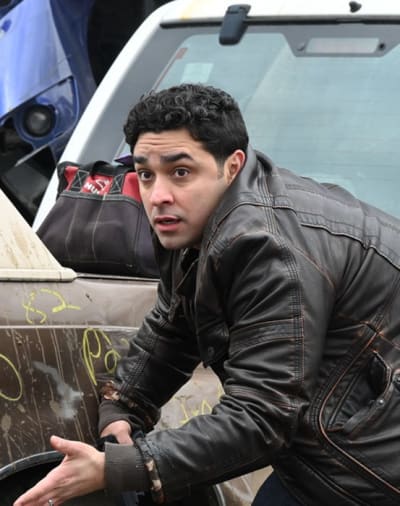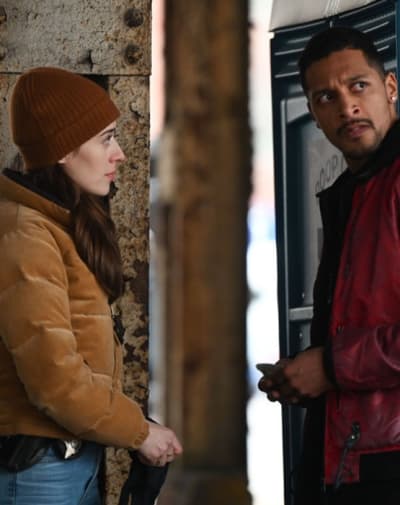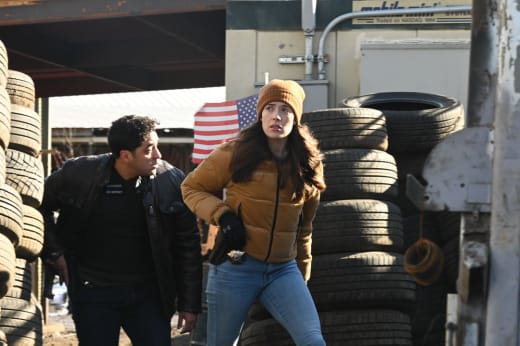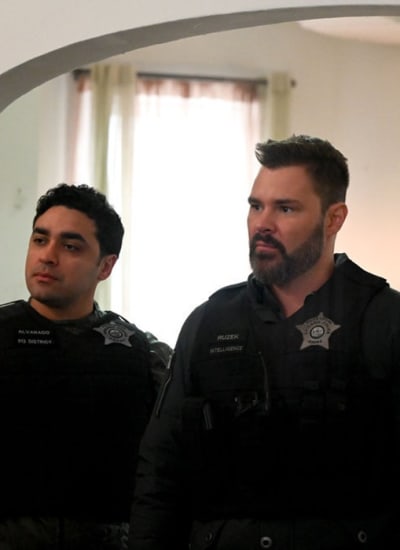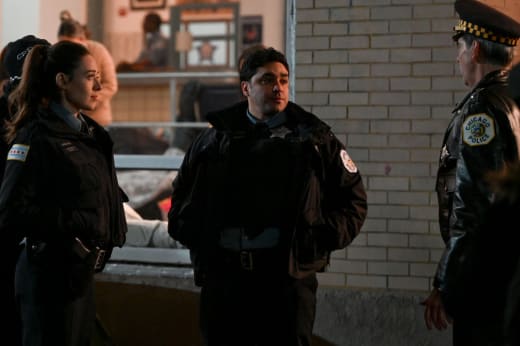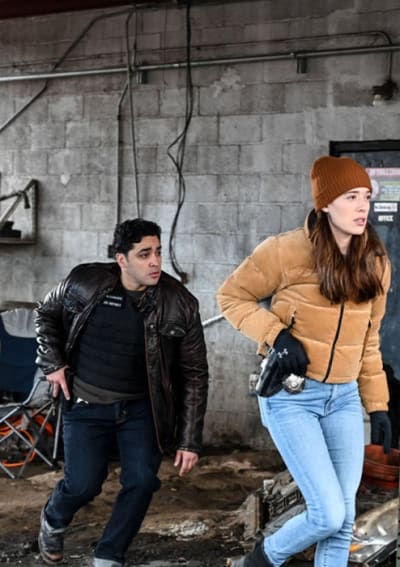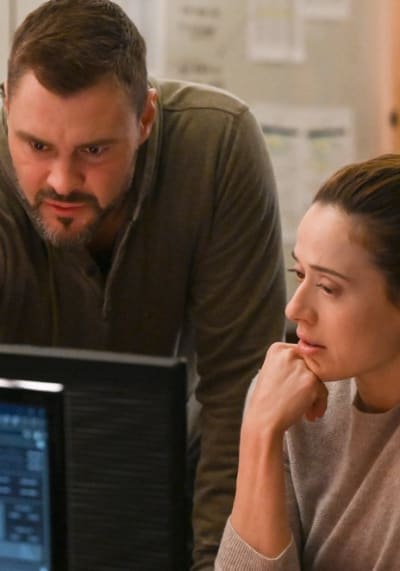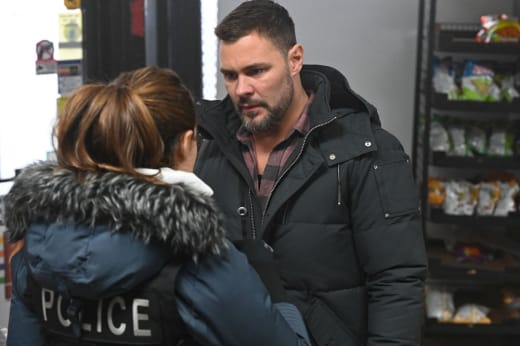
The ending of this hour was seasons in the making.
Somehow, Chicago PD Season 11 Episode 3 was nothing like one would’ve envisioned from the promos, and there’s a lot to parse through regarding the case and mixed feelings about it.
But they threw such a momentous occasion at us in those final moments that it’s likely all anyone will be talking about for the rest of the season.
It seems Chicago PD isn’t completely dark and loveless after all.
Upstead has crumbled before our eyes after riding a high, and now Burzek has reached new heights in the most deceptively understated, quietly stable way.
The hour was a bit misleading, but continuing with the pattern of providing us with character-centric installments, this one foisted Kim Burgess into the spotlight.
And she took the lead brilliantly and beautifully the entire time.
Gabriela, I will never accept that there’s such a thing as an illegal human being.
Kim
It goes without saying that Marina Squerciati is one of the series’ most underrated actors — and she delivers such a wonderfully all-encompassing performance during the hour.
In many ways, the hour showcases her talents well.
Burgess’ fluency in Spanish is one of those things that the series doesn’t utilize that often, and it’s no wonder they hadn’t taken full advantage of her linguistic skills in a case of this caliber before.
I love hearing Squericiati speak Spanish; it sounds so natural and melodic for her, and we have had a full dialogue more than once. It almost felt reminiscent of the effortlessly casual exchanges between Torres and his mother that were so true to form.
But as much as we knew that Burgess was fluent in the language, we never got much of a backstory about how she acquired the skill until now.
It was hard not to chomp at the bits when she shared with Gabriela that her parents weren’t around as much while she was growing up.
We’re 11 seasons into this series, and there are still so many things we don’t know about many characters. So much of Kim’s background has been a mystery.
But we learned so much with so little when she shared that she and her sister spent weekends with their nanny because her parents weren’t always around.
Related: Chicago PD Review: Retread
She’d go the entire weekend not speaking English until she returned to school.
There’s so much to unpack regarding her home life, why she seemed so close to her sister but not her parents, why it’s so crucial for her to spend as much time with Mack as possible, and be the attentive parent she likely didn’t have.
It even gives us some insight into why she may have spent years behaving as she did with Adam Ruzek.
But amid that, Kim’s innate compassion and ability to understand people, particularly victims, shone through.
For Kim, it’s her greatest superpower and what has made her great at her job. It’s where she shines best as a law enforcement officer and how we know she’s been in this job for the right reasons.
So far, Chicago PD Season 11 has peeled back more layers about the characters and has this personal feel that we don’t typically have within the series.
We’re getting more profound insight into these characters we’ve spent years with but still don’t fully know. And there are some great things about this and what we learn.
Kim doesn’t see much difference between herself and the people she’s trying to protect and save.
Something is not right. I had Marshall
Kim
It’s gratifying to realize that as much as she’s experienced, all the trauma that she’s endured and how she’s hardened since her early days in the series, she still hasn’t lost that innate quality — the ability to see the good in people, or herself in the people she tries to protect and save.
The hour went out of its way to touch on the migrant situation. Chicago is a sanctuary city. As a result, there’s a migrant crisis as influxes of these souls hit sanctuary cities and overwhelm the systems put into place to accommodate them.
I, too, am from a sanctuary city, and the heartbreaking conditions, the casual microaggressions, the passionate feelings about their very presence, and the crippling of resources are all very real.
The depiction of all of that was realistic, even unpleasant.
The drive-by appearing as a hate crime at first glance was perfectly reasonable because of the sheer level of hate and violence lobbed at migrants by many who are angry about their very existence.
It wouldn’t have surprised anyone if that’s where the case was headed, but the fact that it was merely a red herring is where things started to get dicey.
Alvarado’s introduction seemed simple enough. He didn’t come across as a bad guy at first glance. His eagerness to work on the case could’ve gotten chalked up to a Brown man who witnessed this shooting and had to experience Raquel dying in his arms, seeking justice.
But he quickly grew suspicious, with the incident at the junkyard serving as the ultimate red flag.
Related: Hailey Upton’s Eventual Departure is a Blessing in Disguise
No one is naive enough not to believe that there aren’t many individuals who take advantage of migrants who don’t have any say, rights, or anything else getting taken advantage of while here.
They’re the perfect victims for just that reason. It’s not unheard of that police officers could take full advantage, abuse their power, and actively hurt people because no one will care about the “illegal aliens.”
The despicable things that Alvarado did were not shocking or fall within some real of implausible because, sadly, most of us know how the world works.
But there’s no getting around how troubling the optics were during this investigation.
Kim, stop talking. You understand you cannot be wrong about this.
Voight
We started with an attack against migrants and the Intelligence Unit parading bigots into the mix, subjecting other characters and viewers to xenophobia and racism.
And then, as if the series wanted to quickly shy away from getting “too political” and preferred to toe the line on this hot-button and controversial issue, they shifted their focus.
Somehow, what resulted was a Latin police officer exploiting other members of the Latin community and inflicting violence and death on them.
The “Boogeyman” of the hour wasn’t the number of potentially violent bigots or the plight of being in a country with virtually no rights.
Instead, the bad guy was a Latin man who raped and killed Venezuelan women and unironically called Kim a “White Savior” for caring more about the “poor Brown people” than he does.
It was certainly an interesting choice.
There was certainly an avenue to delve into the shifting power dynamics among men of color when it comes to bigotry and misogyny — how being a constant victim of one doesn’t preclude them from being the perpetrators of another, which in turn subjects women of color to twice the violence when this hierarchy is evoked.
But Chicago PD is incapable of diving into that well. So essentially, this situation with Alvarado felt incredibly tone-deaf.
It was also a matter of this case excluding Dante Torres.
We could’ve had a great installment that featured a Burgess/Torres pair-up that could’ve been a far more poignant exploration of the migrant crisis and how they’re easy targets.
Not only could we have gotten the two Spanish-speaking team members taking on this case together, but they’re two of the most compassionate unit members who genuinely connect with victims, and it would’ve been beautiful to see that on display.
Torres’ absence during this case felt jarring.
Related: Chicago PD Review: Unpacking
If he were present for it, it would’ve balanced things out better so that we didn’t lean so heavily into the Bad Brown Guy trope.
If the focus were more on Kim and Torres advocating for Gabriela and Raquel and getting justice, we could’ve had a thought-provoking hour instead of focusing more exclusively on Kim, realizing that Alvarado was a shady, disgraceful cop.
By now, any time they introduce a new cop who works with Intelligence on a case, they’re either the bad guy or someone too shady and suspicious.
On the plus, at least this wasn’t a Ruzek storyline; otherwise, the redundancy would rear its head again.
Some of the questionable case choices aside, Burgess was a true force during this installment, and I loved every second of her taking charge.
She’s come a long way as a character, and her confidence has dramatically improved.
She took charge during this case as if she were running the unit herself, and Ruzek and Kevin Atwater were more than happy to follow her lead.
Burzekwater would go to the ends of the earth for one another (they didn’t hesitate to remind us when Kevin was ready to fight over that guy calling Kim a “bitch), and they always work well as a team.
It was indeed Kim’s show, and she was fantastic during this hour, competent, badass, compassionate, and smart as a whip.
You couldn’t even get upset with the woman when she purchased immigration papers for Gabriela.
Her confrontation with Danny was an intense moment. Did anyone notice how Danny went from perfectly fine and normal to this intimidating force in the blink of an eye?
EJ Bonilla was playing two different characters. The switch-up in persona gave a girl whiplash.
Related: Can One Chicago Survive Its Own Changes?
Fortunately, Kim wouldn’t let Danny take the easy way out, and it’s puzzling that he thought there would even be a chance of her allowing him to say goodbye to his family before he killed himself.
Thankfully, Kim could leave that case at the door and only take the more reflective aspects of it home with her.
Her final scenes with Ruzek as she spoke about the case were such strong moments because they highlighted her breakthrough in therapy and her growth.
I loved how she could communicate her thoughts and feelings with him and even draw connections between the case and her life and what she hoped to learn from it.
As long as Kim has Ruzek and Mack, she has something worth fighting for, and she is in the position to voice her needs to Ruzek, which she didn’t readily do before.
She wanted them, and she needed to hear that he would always fight for what they have, their family and happiness, even though she knew the answer already.
Initially, I found the proposal underwhelming. And something must be said about the season’s wonky editing and the decision to tack this scene and plot development at the end of this installment.
They didn’t make any sappy love declarations but more so mature, meaningful promises that sounded casual but were anything but that.
We didn’t get any grand gestures or events like Ruzek taking her out to a fancy dinner or getting down on bended knee.
The proposal felt like an afterthought as if it were a “by the way” type of conversation.
And I want to be annoyed by that, and a part of me is, but I also can appreciate the proposal for what it’s worth and that it suits our seasoned, domesticated Burzek.
At this point, a marriage is just a formality for them. They’re already a committed family. They’ve settled into these roles so well, something Kim noted at the top of the hour, that they’re beyond the flashiness of elaborate proposals.
Kim: Promise me we’ll keep fighting for this. Because I need this, Adam. I need this family.
Adam: You know I will. Yeah, we’ll keep fighting for this for the rest of our lives.
Kim: Nice.
Adam: I was going to do a whole thing here, but this seems better. Let’s get married. Let’s make it forever.
Kim; Third times a charm, huh?
They’re seasoned veterans in their relationship and the healthiest, most stable place ever. They feel so real, like a genuine, committed pairing.
Burzek has been through hell and back together and had a long road to reach this point. But they’re so solid after overcoming all that life has thrown at them as a unit that this understated proposal works for them in many ways.
It’s more meaningful and special; if anything, it’s more.
It wasn’t a flashy, elaborate ordeal, but the understated nature of the scene makes this development special.
Related: Chicago Fire Review: Trapped
That said, I would’ve been perfectly content if the proposal had never happened because there’s a certain beauty in depicting a different view of what a family looks like.
Burgess and Ruzek are already a family whether they’re engaged or married. An engagement or possible wedding feels like theatrics — it’s the show. We don’t actually need it, but I won’t knock them for giving it to us, either.
After the Upstead disaster, Chicago PD didn’t even have to attempt a proposal and wedding again. But if anyone deserves this, Burzek and the legions of shippers who adore this pairing do.
Burzek finally made it. They are the series’ endgame. They’ve come such a long way and earned this, so how can you not be ecstatic?
Over to you, Chicago PD Fanatics.
Are you thrilled about the Burzek proposal and endgame? What did you think about the case? Sound off below.
Chicago PD airs Wednesdays at 10/9c on NBC and the following day on Peacock.
Jasmine Blu is a senior staff writer for TV Fanatic. She is an insomniac who spends late nights and early mornings binge-watching way too many shows and binge-drinking way too much tea. Her eclectic taste makes her an unpredictable viewer with an appreciation for complex characters, diverse representation, dynamic duos, compelling stories, and guilty pleasures. You’ll definitely find her obsessively live-tweeting, waxing poetic, and chatting up fellow Fanatics and readers. Follow her on X.





